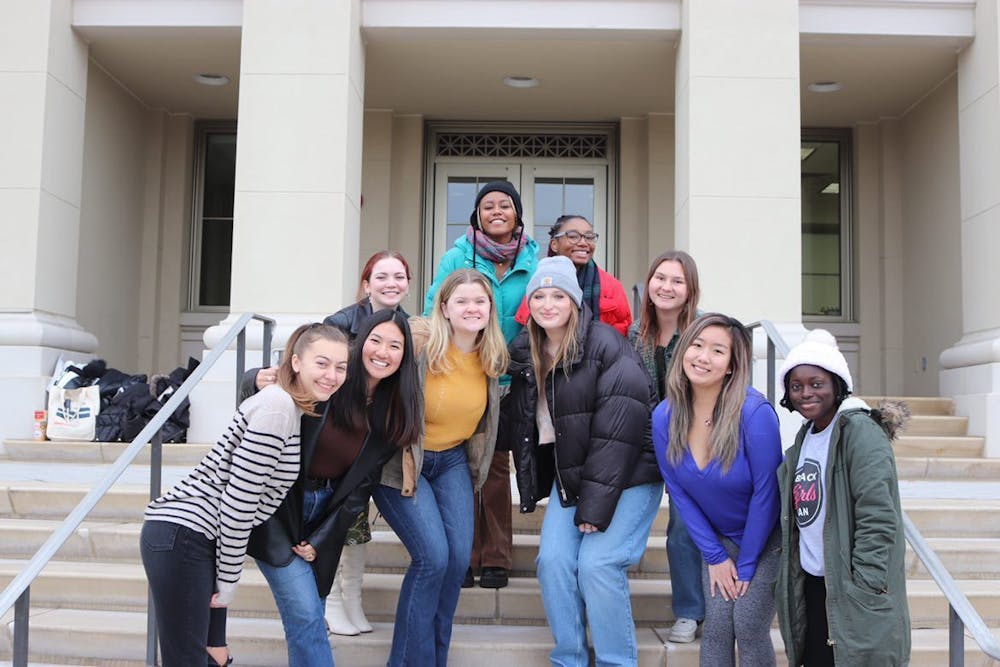From the Newsstands: This story appeared in The Eagle's April 2022 print edition. You can find the digital version here.
Clothing plays a major role in people’s lives, but behind the rose-tinted sunglasses, there are systemic issues in the fashion industry such as cultural appropriation and minimal presence of people of color in leadership positions.
Fashion is a “top-down” industry that allows for companies and designers in higher places of power to have control over who they do not hire, the standard of labor practices and the designs of their clothing. Simultaneously, the monopolization of this space is reserved for those with money and big names, often excluding local minority-owned businesses.
Major fashion houses in recent years have been accused of exploiting styles, motifs and materials from marginalized and religious communities in society without giving credit or context to the original designs and meaning behind them. In 2019, Gucci apologized after having white models wear turbans, a move that prompted backlash from the Sikh community. In 2018, Dolce and Gabbana used Chinese stereotypes in their advertisements for a fashion show that was being put on in China. Prada for promoting a design similar to a 19th-century Blackface character.
Yet, there are campaigns and movements founded by people in the industry who want to see these issues change. In July 2020, Teen Vogue launched a “Black in Fashion Council” that represents and fights for the advancement of Black designers. Models also have taken inspiration from the Black Lives Matter movement and incorporated symbols to protest. Indigenous designers are reclaiming their culture by putting out fashion lines that reflect their Native tribe. Model Jeannie Jay Park wore only AAPI and POC-owned fashion brands for a week.
On American University’s campus, the struggle to make the fashion world more inclusive is a microcosm of societal discussions.
AU’s fashion society, Revolution, is trying to inform people about these flaws and make an impact that speaks to the entire AU student body.
On their Instagram page, you can find posts about events like a sustainability fashion panel and conversations with professionals. Their blog coverage has included D.C. Fashion Week and an Instagram photo series, “Quad of the Week” which features AU student outfits.
“[We had] guest speaker events where people of color come in and speak about what it's like to be a Black woman in fashion and the roles they have and the difficulties they have as well. It was about educating the public by listening to other people’s experiences,” said Julia Smith, a freshman in the School of Public Affairs and blog writer for Revolution.
According to Co-President Natalie Senft, a senior in the Kogod School of Business, Revolution tries to promote social change through events.
“We try to make sure we are putting on events that are representative and discuss relevant issues,” Senft said. “I think we need to work more on collaborating with as many other organizations as possible and bringing in those diverse voices.”
Still, School of Public Affairs freshman Michayla Harris T. said that the club needs to speak and reach out to voices not heard in dominant society, especially because AU is a predominantly white institution.
“Even for me as a Black student, it is hard because people of color are either forced to assimilate or hide away in a little group,” Harris said. “The whole point though is to create a conversation and to promote diversity within it and different types of perspectives from different kinds of people.”
When it comes to recruiting new members, Co-President Rachel Lee, a senior in Kogod, said the club is trying to be “intentional about it and not forceful.”
“The whole point of diversity is because you want to uplift voices not because you feel you have to,” Lee said. “So it’s not that we aren’t doing things, we would like recognition for what we have done because of course it's not perfect, but we are trying.”
Revolution blog writer Nairobi Toombs, a freshman in Kogod, hopes to see more action from Revolution in uplifting designers on campus and that creativity, as well as using social media to showcase how big the D.C., Maryland and Virginia fashion scene is, and how it is a predominantly Black space. Black-owned businesses are a major part of the retail economy in the DMV area.
“Through our articles, we try to uplift everyone,” Toombs said. “We host DEI events to make sure that everyone is included and different voices are heard in our media.”
Part of the challenge of expanding Revolution’s scope as a club comes from the effects of the coronavirus pandemic and the role of the AU Club Council. The club has been trying to shift from an events-based club to a community-based one but has run into roadblocks.
According to both Lee and Senft, because the club was founded in 2020 at the beginning of the pandemic, it has been difficult to recruit people.
“Natalie and I have had very lofty goals for what we want to be able to do,” Lee said. “AUCC is very chaotic, and I understand we have a lot of hoops to go through … Of course, we could always be doing more but that is the bureaucratic side of AUCC not being able to crank out events fast.”
AUCC did not respond to request for comment from The Eagle.
One of their ideas was to host inclusive biweekly meetings to discuss the current issues in the fashion industry, Lee said.
“I think something that Rachel and I really want to push is inclusion and making sure that people feel welcome in our environment,” Senft said. “When Rachel and I came to AU, we really were looking for a space and we didn’t find fashion at AU. We just hope everyone feels welcome and not like they have to change who they are or the fashion they are interested in, in order to be part of our organization.”





